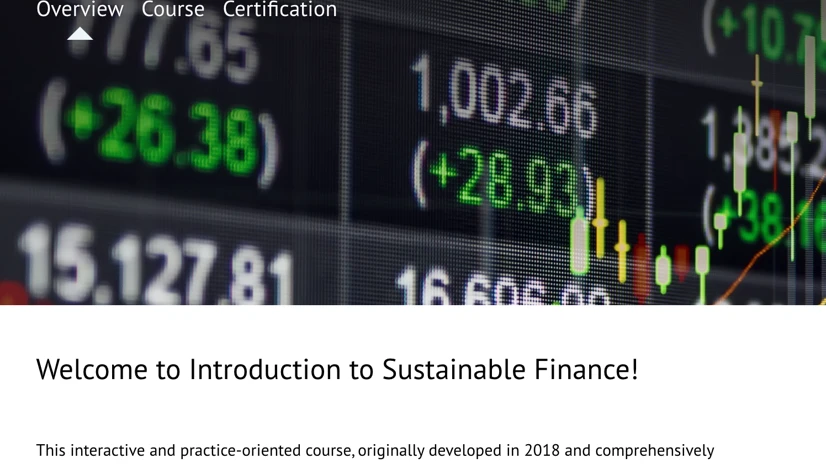Introduction to Sustainable Finance
This interactive and practice-oriented ten hour course was originally developed in 2018 and comprehensively updated in 2021. It covers sustainable finance instruments, methodologies and frameworks for integrating sustainability into financial decisions, key global sustainable finance initiatives, and sustainable finance regulations. The course is designed for students, researchers, policy-makers, as well as people working in the financial and business sector.
Learning Objectives:
- Explains the potential contribution of sustainable finance to achieving the Sustainable Development Goals and the goals of the Paris Agreement on Climate Change
- Explains the core concepts of sustainable finance and the relevance of sustainability considerations for the key actors in the financial system
- Describes the role that regulation and industry initiatives (self-regulation) play in shaping sustainable finance
- Describes different sustainable finance products, such as bonds and loans, that may be available to provide the capital needed to support the delivery of the Sustainable Development Goals and the goals of the Paris Agreement on Climate Change.
Comment from our editors:
This course provides a valuable base to discuss about the topic of sustainable finance. Nevertheless, further (and more critical) literature can be found as follows:
Gabor, D. (2020) Greening the European Financial System Three ideas for a progressive Sustainable Finance agenda. Foundation for European Progressive Studies (FEPS), Roskilde University, University of the West of England (UWE). Available at: https://www.feps-europe.eu/attachments/publications/feps%20paper%20three%20ideas%20gabor.pdf.
Batten, S., Sowerbutts, R. and Tanaka, M. (2020) ‘Climate change: Macroeconomic impact and implications for monetary policy’, in Walker, T. et al. (eds) Ecological, Societal, and Technological Risks and the Financial Sector. Palgrave Macmillan (Palgrave Studies in Sustainable Business In Association with Future Earth). doi: 10.1007/978-3-030-38858-4.
Belloni, M. et al. (2020) The performance and resilience of green finance instruments: ESG funds and green bonds. Available at: https://www.ecb.europa.eu/pub/financial-stability/fsr/focus/2020/html/ecb.fsrbox202011_07~12b8ddd530.en.html
Hache, F. (2019) First policy report – 50 shades of green: the rise of natural capital markets and sustainable finance. Policy Report Part 1. Green Finance Observatory. Available at: https://greenfinanceobservatory.org/2019/03/11/50-shades/


